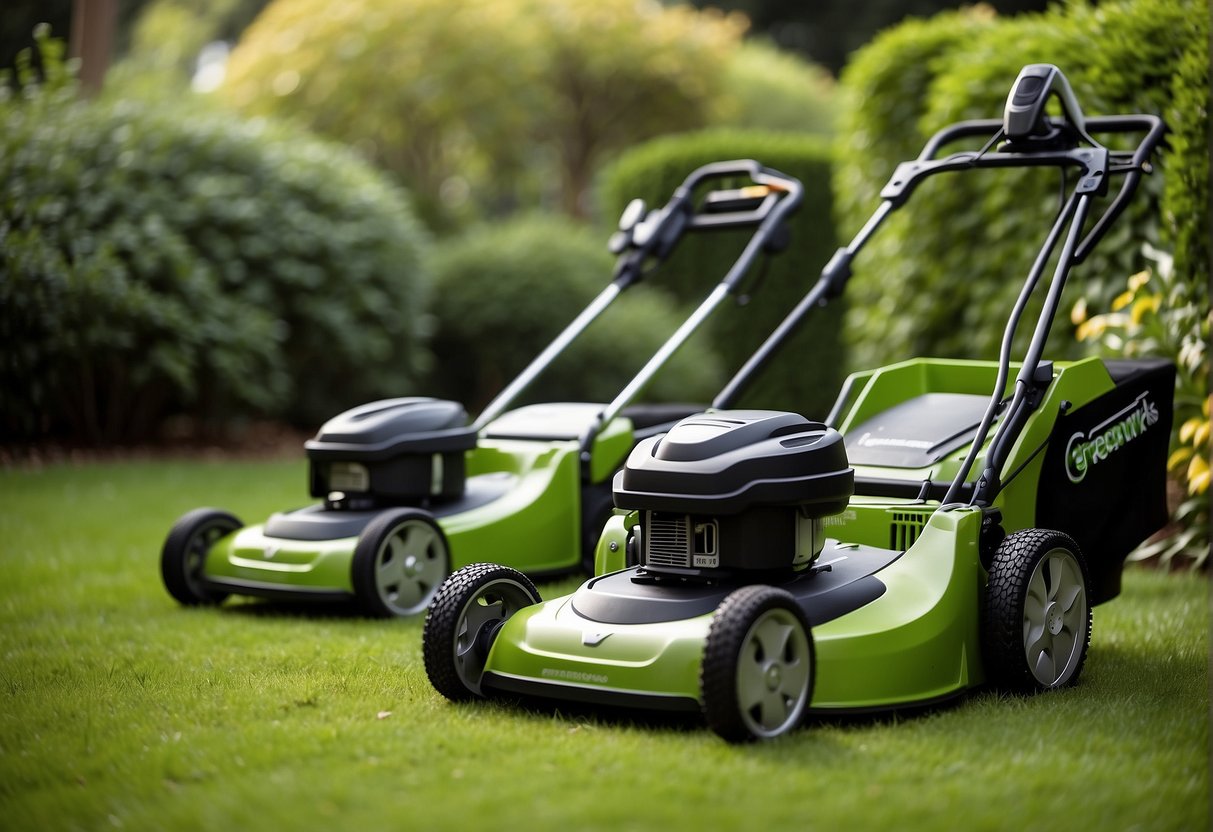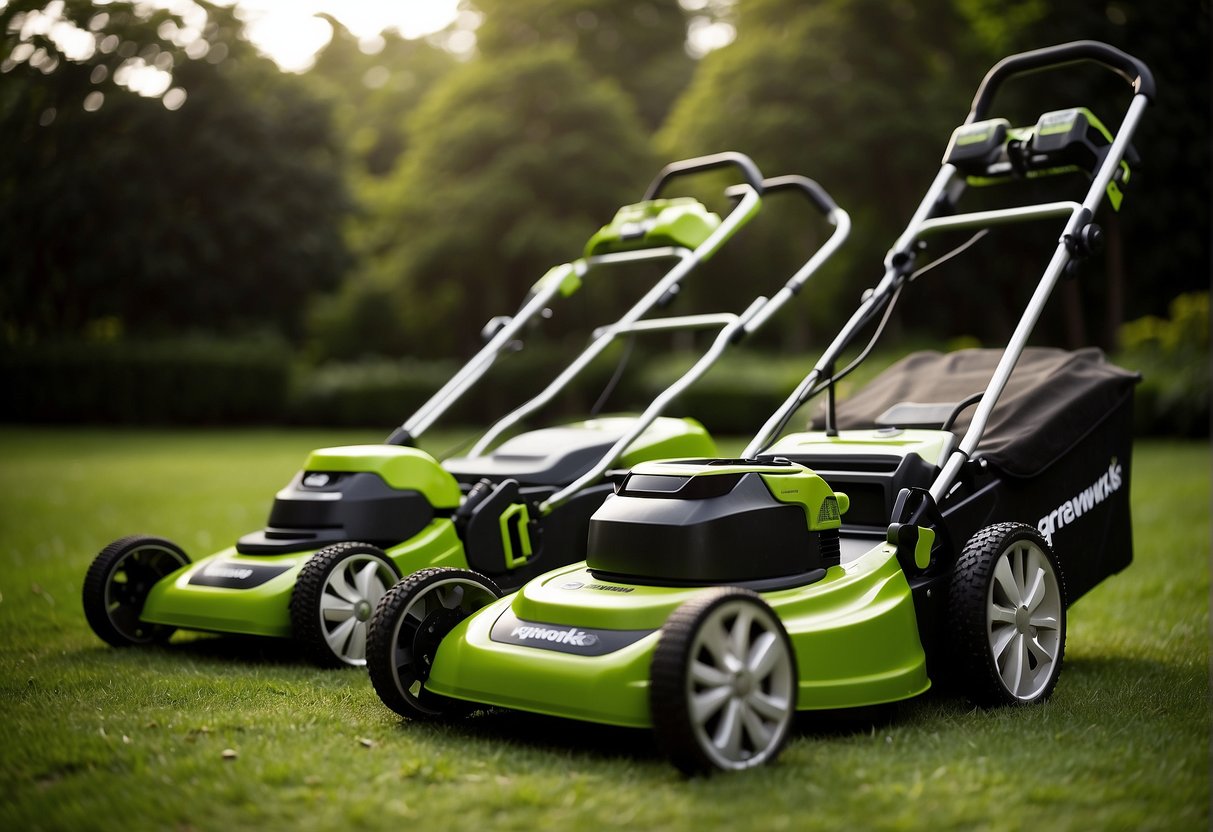Greenworks is a popular brand for cordless outdoor power equipment, offering a range of battery-powered tools for lawn care and landscaping. If you’re in the market for a new Greenworks battery, you might be wondering about the differences between their 80V and 60V power systems. In this article, I will provide a detailed comparison of the two battery types, including their performance, efficiency, product range, and cost considerations.
Comparing Greenworks 80V and 60V Power Systems, both batteries have their own advantages and disadvantages. The 80V battery is more powerful, making it suitable for heavy-duty tasks and larger properties. On the other hand, the 60V battery is lighter and more compact, making it easier to handle and maneuver. When it comes to battery life, the 80V battery has a longer run time, but the 60V battery charges faster.
Performance and Efficiency in Lawn Care are essential factors to consider when choosing between the two battery types. The 80V battery delivers more torque and power, making it ideal for cutting thick grass and weeds. The 60V battery is better suited for lighter tasks, such as trimming and pruning. Both batteries are efficient and eco-friendly, producing zero emissions and reducing noise pollution.
Key Takeaways
- Greenworks offers 80V and 60V power systems for cordless outdoor power equipment.
- The 80V battery is more powerful and suitable for heavy-duty tasks, while the 60V battery is lighter and easier to handle.
- The choice between the two battery types depends on your specific needs and preferences.
Comparing Greenworks 80V and 60V Power Systems
When it comes to battery-powered outdoor equipment, Greenworks is one of the top brands in the market. Their 80V and 60V power systems are both popular choices for homeowners and professionals alike. In this section, I will compare the two power systems based on voltage and power delivery, battery life and runtime, and charging solutions and times.
Voltage and Power Delivery
The most significant difference between the Greenworks 80V and 60V power systems is the voltage. The 80V system delivers more power than the 60V system, making it a better choice for heavy-duty tasks. However, the 60V system is still powerful enough for most residential applications, and it is more affordable than the 80V system.
Battery Life and Runtime
Both the 80V and 60V power systems use lithium-ion batteries, which are known for their long battery life and runtime. However, the runtime of the batteries depends on the tool being used. For example, the Greenworks 80V 21-inch self-propelled lawn mower can run for up to 60 minutes on a single charge, while the Greenworks 60V 21-inch self-propelled lawn mower can run for up to 45 minutes.
Charging Solutions and Times
Greenworks offers a variety of charging solutions for both the 80V and 60V power systems. The standard charger for both systems takes about 2 hours to fully charge a battery. However, Greenworks also offers a rapid charger that can charge the 80V battery in 30 minutes and the 60V battery in 60 minutes. Both systems also feature a battery life indicator that lets you know when it’s time to charge the battery.
In conclusion, the Greenworks 80V power system is more powerful than the 60V system, making it a better choice for heavy-duty tasks. However, the 60V system is still powerful enough for most residential applications and is more affordable than the 80V system. Both systems offer long battery life and runtime, and Greenworks offers a variety of charging solutions to fit your needs.
Performance and Efficiency in Lawn Care
As a lawn care enthusiast, I understand the importance of having the right equipment to achieve the best results. Greenworks 80V and 60V lawn mowers are two of the most popular cordless lawn mowers that offer excellent performance and efficiency. In this section, I will discuss the motor technology and speed control, equipment design, and durability of these mowers.
Motor Technology and Speed Control
Greenworks 80V and 60V lawn mowers are equipped with brushless motors that provide efficient and powerful performance. The brushless motor technology ensures that the mower operates quietly and smoothly, reducing the need for maintenance. The 80V mower has a motor that delivers up to 4.0 HP, while the 60V mower has a motor that delivers up to 3.0 HP. Both motors are powerful enough to handle tough mowing tasks, including thick grass and weeds.
One of the significant differences between the two mowers is the speed control. The Greenworks 80V lawn mower has a variable speed self-propel system that allows you to adjust the speed according to your mowing needs. The 60V mower, on the other hand, has a single speed self-propel system. While the 80V mower may offer better speed control, the 60V mower’s single speed system is still efficient and provides a smooth mowing experience.
Equipment Design and Durability
Greenworks 80V and 60V lawn mowers are designed to be durable and long-lasting. The mowers’ deck is made of high-quality steel that can withstand the rigors of lawn care. The 80V mower has a 21-inch cutting deck, while the 60V mower has a 25-inch cutting deck. The larger cutting deck of the 60V mower allows you to cover more ground quickly.
Both mowers come with a 3-in-1 cutting system that allows you to bag, mulch, or side discharge grass clippings. The cutting height can be adjusted to seven different positions, making it easy to achieve the desired lawn height. The mowers also have easy fold handles that make storage and transportation a breeze.
In conclusion, the Greenworks 80V and 60V lawn mowers are excellent power tools for lawn care. Both mowers offer efficient and powerful performance, and their durable design ensures that they will last for years. While the 80V mower may offer better speed control, the 60V mower’s larger cutting deck allows you to cover more ground quickly.
Product Range and Equipment Compatibility
As a proud owner of both Greenworks 80V and 60V tools, I can confidently say that Greenworks has a vast variety of tools compatible with both battery voltages. In addition to Greenworks’ own tools, some other brands, such as Kobalt and Ego 56V, are also compatible with Greenworks’ batteries.
Variety of Tools and Brands
Greenworks offers a wide range of tools compatible with their 80V and 60V batteries. From lawn mowers to leaf blowers to chainsaws, Greenworks has got you covered. They even offer a snow blower that runs on their 80V battery.
In addition to their own tools, Greenworks’ batteries are also compatible with some Kobalt and Ego 56V tools. However, it’s important to note that not all Kobalt and Ego 56V tools are compatible with Greenworks’ batteries.
Battery Interchangeability and Voltage Options
One of the great things about Greenworks’ batteries is that they are interchangeable within their own voltage range. For example, you can use a Greenworks 60V battery on any Greenworks 60V tool, and the same goes for their 80V battery. This means you don’t have to worry about buying a specific battery for each tool you own.
Greenworks offers both 40V and 80V battery options, but it’s important to note that their 40V batteries are not compatible with their 60V or 80V tools. So, if you’re thinking of upgrading to their 60V or 80V tools, you’ll need to invest in a new battery as well.
In conclusion, Greenworks offers a wide range of tools compatible with their 80V and 60V batteries, as well as some Kobalt and Ego 56V tools. Their batteries are interchangeable within their own voltage range, making it easy to switch between tools without having to buy a new battery every time. However, it’s important to note that their 40V batteries are not compatible with their 60V or 80V tools.
Cost Considerations and Value for Money
When it comes to cost considerations, the Greenworks 80V and 60V models are quite similar. The 80V models are generally more expensive than the 60V models, but this is largely due to the fact that they come with larger batteries. The larger batteries are necessary to power the higher voltage motors, which offer more power and longer run times.
Initial Purchase Price
The initial purchase price for the Greenworks 80V models is generally higher than the 60V models. For example, the Greenworks 80V 21-inch self-propelled lawn mower costs around $100 more than the 60V version. However, it is important to consider the long-term investment and warranty when making a purchasing decision.
Long-Term Investment and Warranty
In terms of long-term investment, the Greenworks 80V models may be a better choice. They come with larger batteries, which means longer run times and less time spent charging. Additionally, the 80V models generally have more powerful motors, which can make yard work tasks faster and more efficient.
When it comes to warranties, both the Greenworks 80V and 60V models come with a four-year limited warranty. This means that if there are any defects or issues with the product within the first four years of ownership, Greenworks will repair or replace the product free of charge.
Overall, the Greenworks 80V and 60V models offer great value for money. While the initial purchase price may be higher for the 80V models, the long-term investment and warranty make them a worthwhile investment for those who need more power and longer run times.
User Experience and Operational Advantages
When it comes to user experience and operational advantages, both the Greenworks 80V and 60V models have their strengths and weaknesses. Here are some key considerations to keep in mind:
Ease of Use and Ergonomics
One of the biggest advantages of both the Greenworks 80V and 60V models is that they are cordless and battery powered. This means that you don’t have to worry about the hassle of gas or a gas engine, which can be a real pain to deal with. Additionally, both models are relatively lightweight and easy to maneuver, which makes them a great choice for people who don’t want to lug around a heavy piece of equipment.
However, there are some differences between the two models when it comes to ease of use and ergonomics. The Greenworks 80V model is generally considered to be more ergonomic, with a more comfortable grip and better weight distribution. This can be particularly important if you’re planning on using the mower for extended periods of time.
Noise Level and Environmental Impact
Another important consideration when it comes to user experience and operational advantages is noise level and environmental impact. Both the Greenworks 80V and 60V models are relatively quiet, which is a big plus if you live in a neighborhood where noise is a concern.
In terms of environmental impact, both models are battery powered, which means that they don’t produce any emissions. This is a big advantage over gas-powered mowers, which can be quite polluting. However, it’s worth noting that the batteries themselves do have an environmental impact, as they need to be disposed of properly when they reach the end of their life.
Overall, both the Greenworks 80V and 60V models have their advantages when it comes to user experience and operational efficiency. When deciding between the two, it’s important to consider your specific needs and priorities, as well as the features and benefits of each model.
Frequently Asked Questions
What are the performance differences between the Greenworks 80V and 60V mowers?
Both the Greenworks 80V and 60V mowers offer excellent performance, but there are some differences between the two. The Greenworks 80V mower has a larger cutting deck, which means it can cut a larger area in less time. It also has a more powerful motor, which allows it to handle thicker grass and tougher terrain. However, the Greenworks 60V mower is still a great option for those with smaller yards or less demanding mowing needs.
Can Greenworks 80V batteries be used in 60V tools and vice versa?
No, it is not recommended to use Greenworks 80V batteries in 60V tools or vice versa. Mixing higher voltage batteries, like an 80V battery in a 60V tool, can damage both the tool and the battery. Overheating and short circuits may occur when voltages are mismatched. It’s important to always use the correct voltage battery for your tool.
How do the costs compare between Greenworks 80V and 60V outdoor power equipment?
Generally, Greenworks 80V outdoor power equipment is more expensive than the 60V series. However, the price difference varies depending on the specific tool and the retailer. It’s important to compare prices and features before making a purchase to ensure you’re getting the best value for your money.
What are the main benefits of choosing the Greenworks Pro 80V over the 60V series?
The Greenworks Pro 80V series offers some advantages over the 60V series. The 80V series has a more powerful motor, longer runtime, and faster charging time. Additionally, the 80V series has a larger selection of tools available, including a snow blower and a chainsaw. However, the 60V series is still a great option for those with smaller yards or less demanding outdoor power needs.
Has the Greenworks 60V line been discontinued, and what does that mean for existing users?
No, the Greenworks 60V line has not been discontinued. However, Greenworks has shifted its focus to the 80V series, so there may be fewer new tools and accessories released for the 60V line in the future. Existing users can still purchase replacement parts and batteries for their 60V tools.
In terms of power and runtime, how does the 80V battery compare to the 40V and 60V options?
The Greenworks 80V battery offers more power and longer runtime than the 40V and 60V options. The 80V battery has a higher voltage and larger capacity, which allows it to power larger and more demanding tools for longer periods of time. However, the 40V and 60V batteries are still great options for those with smaller yards or less demanding outdoor power needs.

Hi, I’m Sal Muller of Tooltrip.com. My DIY experience led me to understand essential power tools for home projects. Tooltrip.com guides enthusiasts and professionals in choosing right tools for any job. I provide concise top tool reviews for easier, efficient DIY.



